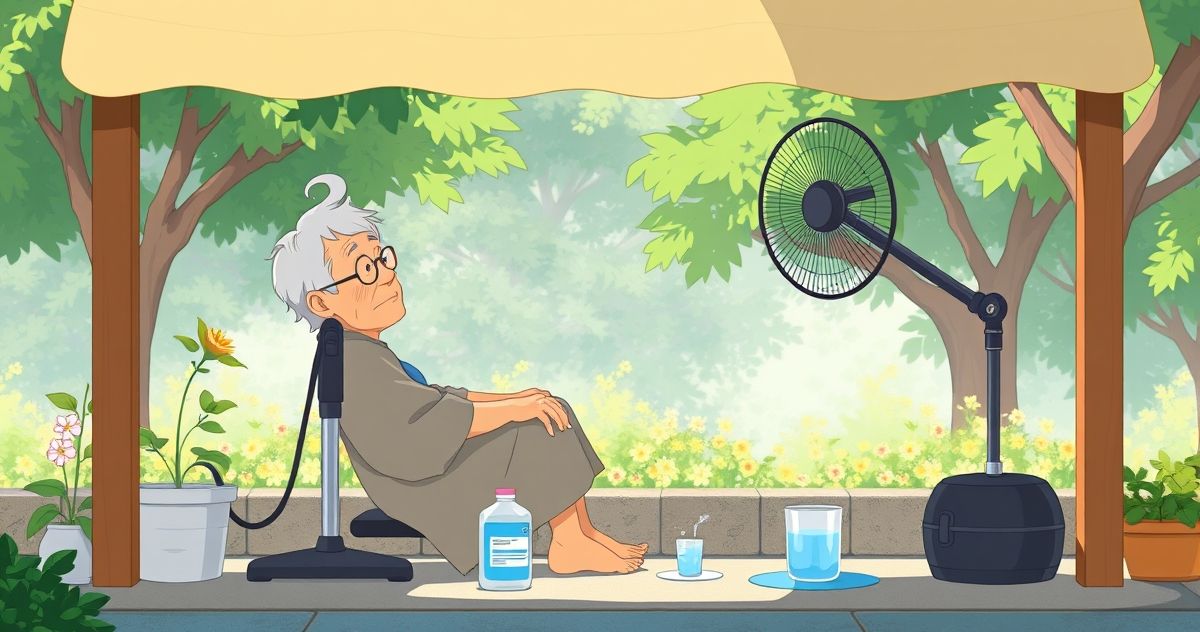
Nationwide Emergency Response to Record-Breaking Heat
As South Korea faces an unprecedented heatwave with temperatures soaring above 37°C in some regions, local governments across the nation are implementing comprehensive protection measures for vulnerable populations. The Korea Meteorological Administration has issued heatwave warnings for most regions, with some areas expected to be upgraded to severe heatwave alerts.
Local Government Response Measures
Jeongeup City's Comprehensive Approach: After recording its highest-ever temperature of 37.8°C on July 9th, Jeongeup City launched an all-encompassing safety management system for elderly and disabled residents. The city conducts daily wellness checks on elderly individuals living alone, those with mobility issues, and chronic disease patients, providing medical referral services when necessary.
A Jeongeup City official stated, "We've established a tight safety net through collaboration between community administrative centers, village heads, and women's association leaders to ensure no one falls through the cracks. We're maintaining continuous care as the heat is expected to persist through September."
Gyeonggi Province's Industrial Safety Focus: The province has implemented emergency heatwave measures including comprehensive inspections of construction sites and cooling centers. Outdoor workers are now required to have adjusted working hours, adequate rest periods, and protective equipment including shade structures and cooling vests.
Sejong City's Top-Down Leadership: Mayor Choi Min-ho personally issued directives for heatwave response, emphasizing proactive administration to protect outdoor workers and vulnerable groups. The city has extended cooling center operating hours and enhanced services including air conditioning and cold water provisions.
Understanding Heat Vulnerability
Medical professionals warn that elderly individuals and those with chronic conditions face 3-5 times higher risk of heat-related illnesses due to compromised thermoregulation abilities. Isolated elderly residents are particularly at risk due to delayed emergency response capabilities.
An official from the Korean Society of Emergency Medicine emphasized, "Early response to heat-related illnesses is literally a matter of life and death. Continuous monitoring and preventive measures for vulnerable populations are absolutely crucial."
According to Korea Disease Control and Prevention Agency statistics, adults aged 65 and older accounted for 42.3% of all heat-related illness cases last year, with a high proportion among isolated elderly and basic livelihood security recipients.
Innovative Protection Programs
Seoul's Home Visit Services: The capital operates a "Visiting Health Care Service" where healthcare professionals directly visit vulnerable households to check health conditions and connect with medical services when needed.
Busan's AI-Powered System: The city has introduced an AI-driven heatwave risk prediction system that sends customized alerts based on regional and demographic factors. Isolated elderly and disabled households receive 24-hour monitoring through automated wellness check systems.
Daegu's Safety Call Service: The city operates a daily "Heatwave Safety Call Service" that contacts vulnerable individuals at scheduled times. If calls go unanswered, designated officials or social workers immediately conduct home visits.
Public-Private Partnership Models
Community-level cooperation for vulnerable population protection is actively developing. Local social welfare centers, senior centers, and community halls serve as temporary cooling centers, while volunteers assist with elderly wellness checks and essential supply distribution.
A representative from the Korea Association of Social Welfare Centers noted, "Over 400 social welfare centers nationwide are operating heatwave response programs, providing customized services tailored to regional characteristics to protect vulnerable populations."
Religious organizations and civic groups are also participating in vulnerable population support. Churches, temples, and other religious facilities have opened their doors as cooling centers, while civic organizations conduct campaigns providing fans, ice packs, and bottled water.
Technology-Enhanced Smart Response
Some municipalities are introducing smart heatwave response systems utilizing ICT technology. IoT sensors monitor real-time indoor temperatures in vulnerable households, automatically alerting relevant agencies when dangerous levels are reached.
Smart watch-based health monitoring services are gaining attention, measuring heart rate, body temperature, and activity levels in real-time, sending immediate alerts to family members or responsible agencies when abnormal signs are detected.
Future Challenges and Improvements
Experts emphasize that protecting vulnerable populations from heatwaves requires comprehensive and systematic approaches beyond simple responses. Establishing prevention-centered proactive response systems and developing customized measures reflecting regional characteristics are particularly important.
Professor Lee Seung-jong from Yonsei University's Department of Health Administration advised, "Heatwave response should be approached as a public health issue rather than disaster management. We need to build integrated support systems that comprehensively consider vulnerable populations' health conditions and living environments."
Systematic support at the central government level and efforts to bridge gaps between local governments are also necessary. National-level support expansion is needed so that financially constrained municipalities can provide adequate heatwave response services.
Importance of Community Participation
Experts emphasize that community members' interest and participation are key to protecting vulnerable populations from heatwaves. Neighborly concern and care are the first steps to saving lives.
A Ministry of Health and Welfare official stated, "Government and local government efforts alone have limitations. It's important for all community members to take interest in heat-vulnerable populations and create a culture of collective care."
With this summer's heatwave expected to continue through September, sustained attention and effort from society as a whole are needed to protect vulnerable populations. Particularly careful attention to isolated elderly, mobility-impaired individuals, and chronic disease patients is crucial at this time.
Original Article: Read the full Korean version


0 Comments